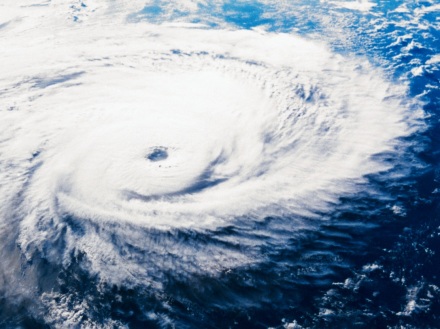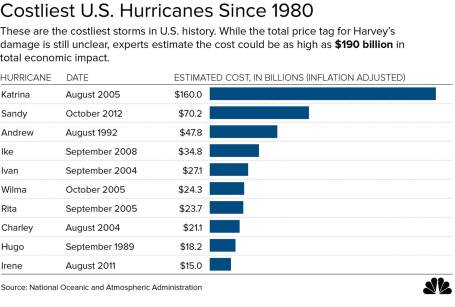

It was a tumultuous month politically, economically, and meteorologically. The devastating destruction left in the wake of Hurricane Harvey’s 130 mile per hour winds and 50+ inches of rain displaced more than 30,000 people in Texas, destroyed upwards of 40,000 homes, and created estimated damages of $190 billion, making this storm the costliest hurricane in history (see table below).

But Hurricane Harvey wasn’t the only destructive force wreaking havoc on Americans. There were numerous geopolitical storms raining down over the newswires as well, including the following:
North Korea Nuclear Standoff: The war of words between North Korean dictator Kim Jong Un and President Trump intensified significantly. When leader Kim Jong Un threatened to launch missiles at the U.S. mainland and Guam, President Trump responded by warning that North Korea would face “fire and fury,” if the U.S. is provoked and promised our military was “locked and loaded.” Defense Secretary Jim Mattis backed the president by cautioning North Korea it would be “game on,” if North Korean missiles were fired against U.S. territories. Tensions were raised after a provocative North Korean ballistic missile test aimed at the U.S. was launched over Japan into the Pacific Ocean.
Racial Strains in Charlottesville: A demonstration in Charlottesville, Virgina, protesting the removal of a Confederate statue of General Robert E. Lee, led to the death of protester Heather Heyer by a neo-Nazi participant (Ku Klux Klan and white nationalists were also participants in the protest). After many journalists criticized President Trump for a lukewarm response, his top economic adviser Gary Cohn stirred the political pot by saying, “I believe this administration can and must do better in consistently and unequivocally condemning these groups and do everything we can to heal the deep divisions that exist in our communities.” Attorney General Jeff Sessions called the incident “domestic terrorism.”
















